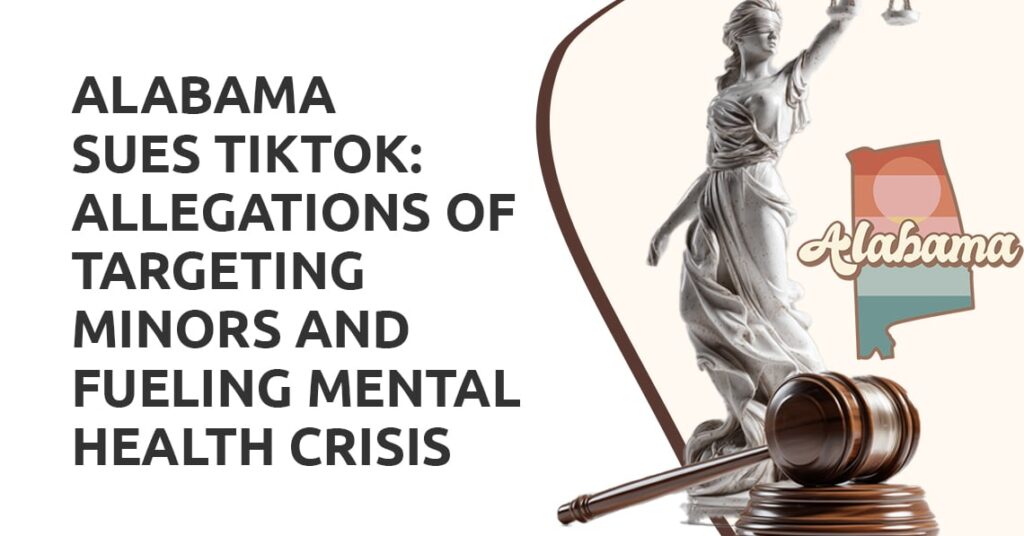Key takeaways
- Alabama’s lawsuit alleges that TikTok’s algorithm deliberately retains minors engaged with dangerous content material, together with materials that promotes self-harm and consuming issues.
- TikTok’s “Youngsters Mode” and “Restricted Mode” have been criticized as insufficient in defending minors, with claims that they’re simply bypassed, making them ineffective in real-world utility.
- TikTok’s connection to ByteDance has raised additional considerations about information privateness, with accusations that non-public data may be exploited by the Chinese language authorities, doubtlessly compromising U.S. residents’ safety.
- The lawsuit in opposition to TikTok is a part of a rising development of U.S. states taking authorized motion in opposition to the platform over its impression on youngsters’s psychological well being and information safety.
In a big transfer, the state of Alabama has filed a lawsuit against TikTok and its dad or mum firm, ByteDance, accusing the platform of concentrating on minors and exacerbating the psychological well being disaster amongst Alabama’s youth.
The lawsuit, filed within the Montgomery County Circuit Courtroom, seeks civil penalties below Alabama’s Deceptive Trade Practices Act, together with compensatory and punitive damages. Alabama Lawyer Basic Steve Marshall introduced the lawsuit, emphasizing the hurt TikTok allegedly causes to youngsters and households throughout the state.
Accusations of Exploitation and Dangerous Content material
The core of the lawsuit facilities on claims that TikTok’s algorithm is particularly designed to seize the eye of minors, protecting them hooked on dangerous content material. Lawyer Basic Marshall criticized the platform for feeding younger customers with damaging materials that promotes melancholy, self-harm, consuming issues, and drug use, alongside harmful viral challenges.
Marshall has been outspoken in his perception that TikTok intentionally exploits weak younger individuals by steering them towards more and more disturbing content material. He said,
“TikTok preys on younger individuals, feeding them harmful and damaging content material whereas mendacity to folks about how secure the app actually is. This platform was designed to addict youngsters and put earnings forward of the psychological well being of a complete era.”
Along with accusations of dangerous content material, the lawsuit highlights TikTok’s safety measures—particularly, its “Youngsters Mode” and “Restricted Mode”—which are supposed to block inappropriate content material however are allegedly simply bypassed.
These so-called security options are described within the lawsuit as ineffective and mere advertising instruments designed to deceive mother and father into believing the app is secure for youngsters.
Considerations Over Knowledge Privateness and Nationwide Safety
The lawsuit additionally raises considerations about TikTok’s ties to ByteDance, a Chinese language-based firm. Marshall echoed fears voiced by U.S. lawmakers about TikTok’s information assortment practices, which he claims may doubtlessly be used for espionage. The lawsuit alleges that ByteDance’s obligations below Chinese language regulation to share information with the Chinese language authorities put American customers in danger, notably minors who use the app.
The connection between TikTok and ByteDance has been some extent of competition for years, with critics arguing that the app might be used as a software for amassing delicate information on American customers. This lawsuit underscores the rising anxiousness round nationwide safety points tied to foreign-owned tech platforms.
Learn additionally:
Learn additionally:
Rising Bipartisan Considerations
The lawsuit filed by Alabama follows a similar suit in 2024, the place a bipartisan group of U.S. state attorneys basic took authorized motion in opposition to TikTok for its impression on youngsters’s psychological well being. This new wave of authorized scrutiny in opposition to TikTok comes because the platform’s affect over youthful generations continues to develop, with a big proportion of its consumer base being minors.
In accordance with the lawsuit, over one-third of TikTok’s each day customers in america are 14 or youthful, a demographic TikTok allegedly focused by way of its addictive algorithm. The lawsuit claims that TikTok’s capacity to maintain younger customers engaged for lengthy intervals, by way of content material that appeals to their feelings, has had severe penalties on their psychological well being.
What’s Subsequent for TikTok in Alabama?
The authorized battle between Alabama and TikTok has the potential to set a precedent for different states and governments globally, as they proceed to research TikTok’s practices surrounding consumer privateness and content material promotion. The lawsuit seeks not solely financial compensation but additionally injunctive reduction, which means that Alabama desires TikTok to halt its alleged deceptive practices concerning youth security.
TikTok, which has beforehand confronted scrutiny over comparable considerations from each U.S. and worldwide authorities, has not but commented on the specifics of the Alabama lawsuit. Nevertheless, the corporate has constantly denied any wrongdoing, sustaining that it prioritizes the protection and well-being of its customers, particularly minors.
The Street Forward
Because the authorized proceedings unfold, the way forward for TikTok in Alabama—and doubtlessly in different states—stays unsure. The app’s immense recognition amongst younger customers continues to develop, making it a central a part of the digital panorama. Nevertheless, with rising regulatory scrutiny and authorized challenges, TikTok’s capacity to function freely within the U.S. might be in danger.
For now, Alabama’s lawsuit serves as a stark reminder of the potential risks that include platforms designed to seize and preserve the eye of younger customers, and the rising want for stricter laws to guard youngsters within the digital age.
Whether or not this lawsuit will result in a broader regulatory crackdown or set a brand new authorized precedent stays to be seen. What is obvious, nonetheless, is that TikTok’s future in the U.S. is prone to face extra scrutiny as states and governments push for better accountability and transparency from the platform.
